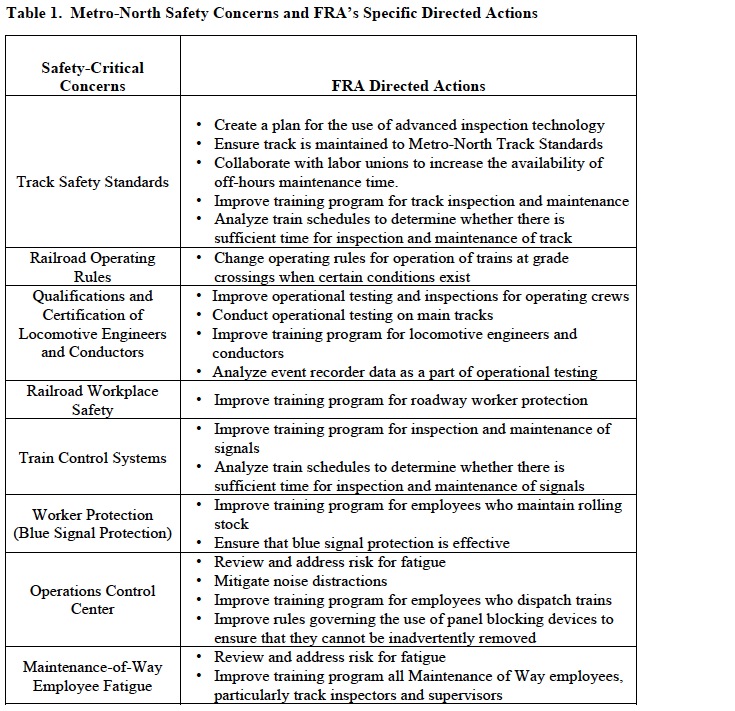FEDERAL RAILROAD ADMINISTRATION
Executive Summary
This report of the Federal Railroad Administration (FRA) on its safety assessment of the Metro-
North Commuter Railroad (Metro-North), called Operation Deep Dive, is provided to Congress
pursuant to report language in the Fiscal Year (FY) 2014 Omnibus Appropriations Act.
Metro-North is the second largest commuter railroad in the Nation, serving New York,
Connecticut, and New Jersey, with an annual ridership of almost 83 million people. Metro-
North is a subsidiary agency of the Metropolitan Transportation Authority (MTA), a New York
State Authority.
In 2013, four high-profile accidents occurred on Metro-North (Appendix 1).
- On May 17, 2013, in Bridgeport, Connecticut, an accident occurred on Metro-North’sNew Haven Line, when an eastbound Metro-North train of 8 cars, traveling 74 mph,derailed and came to rest on an adjacent track. Approximately 20 seconds later, a west bound Metro-North train on that adjacent track struck the derailed train. As a result of the accident, more than 50 people, some seriously injured, were hospitalized, rail operations were suspended, and millions in property damage occurred.
- On May 28, 2013, a second accident occurred when a Metro-North train in West Haven,Connecticut, that was traveling 70 mph, struck and killed a Metro-North maintenance-of-way(MOW) employee who was part of a roadway work group performing railroad maintenance on a construction project.
- On July 18, 2013, a third accident occurred when a CSX Transportation freight train derailed while traveling over Metro-North’s system. No one was injured, but property damage was significant.
- On December 1, 2013, the fourth accident occurred when a Metro-North train of 7 cars traveling south from Poughkeepsie, New York, to Grand Central Terminal in New YorkCity, derailed as it approached the Spuyten Duyvil Station. All cars derailed and the front cab came to rest close to the Harlem River. Four passengers were killed, and more than70 were injured. Rail operations were suspended, and millions of dollars in property damage alone was sustained.
On December 3, 2013, 2 days after the fourth and most serious of these accidents, FRA sent a
letter to MTA expressing support for Governor Andrew Cuomo’s directive that MTA hold a
safety stand-down, and directing Metro-North to implement a Confidential Close Call Reporting
System (C3RS) (Appendix 2). Additionally, FRA issued Emergency Order 29 and Safety
Advisory 2013-08.
Emergency Order 29, issued on December 6, 2013, required Metro-North to take
immediate action to prevent excessive train speeds by identifying and prioritizing high risk
areas, modifying its existing signal system to ensure speed limits are obeyed, and requiring a higher level of engagement and communication among operating
crew members in areas in which major speed restrictions are in place.
Safety Advisory 2013-08, issued on December 10, 2013, urged railroads to provide
additional training, increase the frequency of operational testing, and reinforced the
importance of communication between crew members. The purpose was to ensure that
all railroads adhere to Federal regulations and railroad operating rules regarding
maximum authorized train speed limits.
On December 16, 2013, FRA launched Operation Deep Dive, an assessment of Metro-North’s
operations and safety compliance. More than 60 technical and human factor experts comprising
14 teams, conducted a 60-day comprehensive safety assessment of Metro-North. With assistance
from the Federal Transit Administration, these experts reviewed and assessed Metro-North’s
safety-related processes and procedures, its compliance with safety regulations and requirements,
and its overall safety culture.
In assessing Metro-North, the Deep Dive team evaluated:
- Track, signal, and rolling stock maintenance, inspection, and repair practices;
- Protections for employees working on rail infrastructure, locomotives, and rail cars;
- Communication between the Mechanical and Transportation Departments at maintenance facilities;
- Operations Control Center procedures and rail traffic controller training;
- Compliance with Federal hours-of-service regulations, including fatigue management programs;
- Operational data collected to measure the efficiency of employees’ comprehension and execution of all applicable Federal regulations;
- Locomotive engineer oversight;
- Engineer and conductor certifications; and
- Operating crew medical requirements.
Based on this evaluation, FRA identified three overarching safety concerns that affect all facets
of Metro-North:
- An overemphasis of on-time performance;
- An ineffective Safety Department and poor safety culture; and
- An ineffective training program.
Within these three areas, FRA identified and prioritized specific safety concerns and directs
Metro-North to take actions to mitigate the risks, shown in Table 1.
During Operation Deep Dive, FRA teams met regularly with Metro-North leadership and staff,
who were very receptive to learning about the Deep Dive teams’ findings and recommendations.
Where appropriate and practicable, Metro-North immediately implemented corrective actions in
response to the safety concerns that FRA identified. To further improve the safety of Metro-
North’s operations and procedures, FRA will continue its oversight in order to ensure that the immediate improvements implemented during Deep Dive are reviewed, evaluated, and modified,
as appropriate.
Download full version (PDF): Metro-North Commuter Railroad Safety Assessment
About the Federal Railroad Administration
www.fra.dot.gov
“The Federal Railroad Administration (FRA) was created by the Department ofTransportation Act of 1966. It is one of ten agencies within the U.S. Department ofTransportation concerned with intermodal transportation. FRA promotes safe,environmentally sound, successful railroad transportation to meet the needs of all customers today and tomorrow.”
Tags: Connecticut, CT, Federal Railroad Administration, FRA, Metro-North, New York, NY, Operation Deep Dive, safety







 RSS Feed
RSS Feed